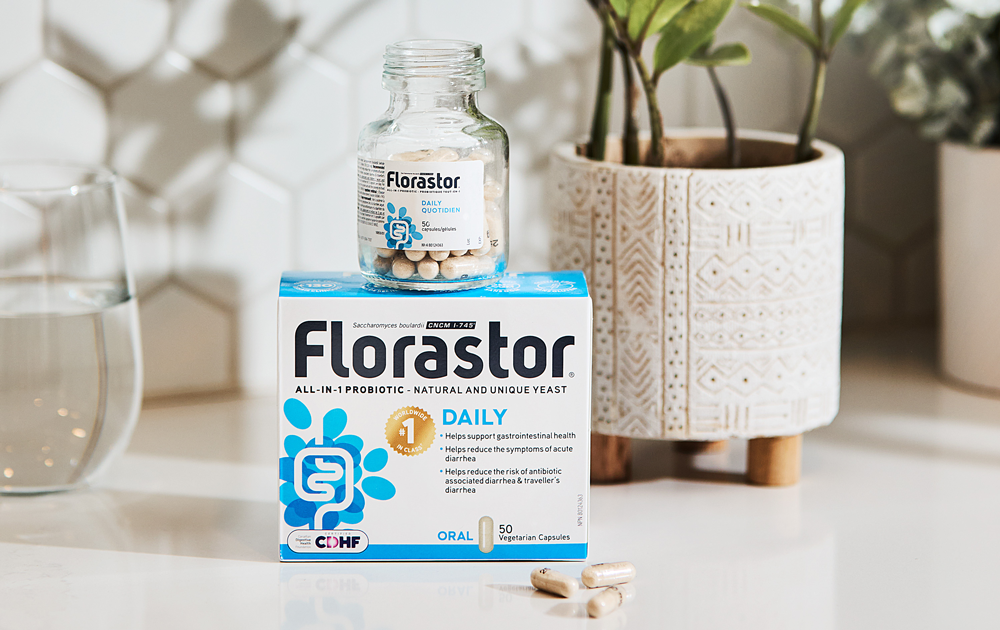First and foremost, I’d like to wish everyone a very happy World Digestive Health Day!
We’ve got a very insightful piece of content of lined up to celebrate this special occasion so buckle up and get ready to learn all about optimizing your digestive health as you age.
I know from my professional practice just how much curiosity exists around longevity and how we can utilize diet, lifestyle and supplementation to maximize the length and quality of our life.
It goes without saying that the maintenance of a healthy gut, particularly a healthy gut microbiome, has a massive role to play in this regard.
With that in mind, today’s article will focus on three key areas of inquiry:
- How aging affects our gut health?
- How we can improve gut health as we age?
- The role Florastor has to play
I simply can’t wait, let’s get to the good stuff!
How Does Aging Affect Gut Health?
It’s no secret that aging affects all aspects of human health.
The risk of conditions like high blood pressure, dementia, heart disease, diabetes and multiple types of cancer are all higher in older people.
What not everyone realizes, however, is that the digestive tract and particularly the gut microbiome is also susceptible to aging.
Remember that about 80% of the human immune system is located in the digestive tract and changes in this part of the body could also partially explain why immune system functionality decreases with age in a process referred to as “immunosenescence” - a fancy way to say immune system aging.
There’s a great deal of emerging evidence on the gut microbiome that might help us to better understand why this is.
A 2019 study out of BMC Microbiology identified aging trends in the gut microbiome whereby certain species of beneficial bacteria noticeably declined with age while other species of bacteria associated with inflammation and disease states tended to increase.
Taking it a level further, a 2021 study out of Nature Metabolism looked at microbiome trends in over 9,000 adults aged 80+ and found that those who lived the longest, healthiest lives had observable similarities in their gut microbiome.
We have a lot more to learn in this area but certainly one of the microbiome related issues that can become more common with aging is dysbiosis – which relates to a loss of overall diversity in one’s gut microbiome.
Dysbiosis is a major driver of inflammation which in turn drives disease risk and aging in a process some scientists refer to as inflammaging.
It’s clear that the microbiome changes with age and the nature of these changes has a big hand to play in dictating human health so the question is what can we do from diet, lifestyle and supplemental perspective to optimize our gut microbiome as we age?
Let’s find out!
Improving Gut Health With Age

There are multiple things an otherwise healthy person can do to maintain and bolster their gut microbiome as they age.
1. Consistent Physical Activity - The World Health Organization (WHO) recommends adults to engage in a minimum of 150 minutes of moderate intensity or 75 minutes of vigorous-intensity physical activity on a weekly basis.
A 2017 study out of PLoS One used these recommendations as a cut off point in analyzing people’s microbiomes and found that physical activity at this level can increase the populations of various types of healthy bacteria in the microbiome.
2. Strategic Dietary Changes - As a dietitian I can say with great confidence that the vast majority of nutrient dense foods can positively influence the human gut microbiome.
There are, of course, certain families of foods that may have unique effects above and beyond the average though.

➤ Fermented Foods like kimchi, kefir, kombucha (among others) have recently been demonstrated in human studies to both increase the diversity of the microbiome and to reduce markers of inflammation.
➤ Prebiotic-Rich Foods are those which contain specific types of fibre or other compounds that preferably act as “food” for our healthy gut bacteria and enhance their growth and flourishing. There are several families of foods with prebiotic properties, all of which have a host of other health and longevity benefits.
➤ Legumes such as chickpeas, lentils, beans and peas
➤ Vegetables such as asparagus, garlic, onion and cabbage
➤ Fruits such as apples, peaches, pears, oranges and bananas
➤ Nuts/Seeds such as cashews, flax, pistachios and almonds
➤ Starches like whole wheat bread, barley, oatmeal and even leftover* pasta, rice and potato (*the act of cooking/cooling changes the starch in these foods increasing prebiotic potential).
Interestingly enough, each of the foods above fit perfectly into the Mediterranean Diet style of eating which has been demonstrated to improve microbiome profiles and reduce age-related frailty.
➤ Relaxation Practices: Although a great deal more work is going to be required in this area before strong claims can be made, there is a growing body of evidence suggested that relaxation practices such as yoga and meditation can contribute meaningfully to gut health and potentially the gut microbiome.
This makes sense theoretically, given the proposed negative role that stress plays in gut and overall health – but more research will be required for us to better understand the true effects of these practices.
The Role Of Florastor In Healthy Aging
There is little question of the fact that probiotics have an important role to play in maintaining gut health for the aging population at large.
Florastor is recommended by the Canadian Digestive Health Foundation (CDHF), and the World Gastroenterology Organization (WGO) because it contains a unique probiotic strain : Saccharomyces boulardii CNCM I-745 with unique benefits that are backed by 65+ years of use and 130 clinical trials.
But what role does it have to play in maintaining our gut health as we age?
Consider that a number of the infectious pathogens Florastor has been studied to help with, such as H. Pylori and C. Difficile, are more likely to affect older people.
These infections have the potential to disrupt our gut microbiome and lead to acute diarrhea and other digestive health concerns.
Florastor promotes a healthy gut flora, intestinal balance and strengthens your immune system both by directly binding and eliminating infectious bacteria and by stimulating a cascade of helpful anti-inflammatory responses within our digestive tract including.
It has been well documented that the human gut microbiome has the potential to become less diverse with age and that strategic probiotic use has the potential to maintain and restore microbiome diversity.
This is important because a loss of microbiome diversity can mean a loss in important probiotic species that are responsible for producing beneficial compounds known as short chain fatty acids (SCFAs).
SCFAs have a number of very important health effects which stem from the fact they are the preferred fuel source for certain types of cells within our digestive tract.
Keeping these cells well fueled further allows the gut microbiome to flourish, which adds on to the positive influence that SCFAs have on stimulating the release of anti-inflammatory and pro-immune health compounds.
We must also consider that as we age we are more likely to have accumulated more antibiotic use, which potentially means more antibiotic associated diarrhea (AAD).

Florastor, again, has been well studied as a tool to both manage and reduce the risk of AAD.
But it goes beyond that, because antibiotic use also disrupts the gut microbiome killing off unhelpful as well as helpful bacteria.
Florastor has been demonstrated in human studies to reduce the negative effects of antibiotics on the microbiome.

In conclusion, probiotics supplements have many health benefits. As we age we may face several digestive issue, more frequently than younger people. That’s why including a probiotic in our daily routine is important. But don’t rely on just any probiotics, instead choose a trusted scientifically proven probiotic such as Florastor, that has more than 130 clinical studies, conducted over the past 65 years.

Andy De Santis, RD MPH (Registered Dietitian) @AndyTheRDandytherd.com

.jpeg?sw=375&sfrm=png&q=90)


